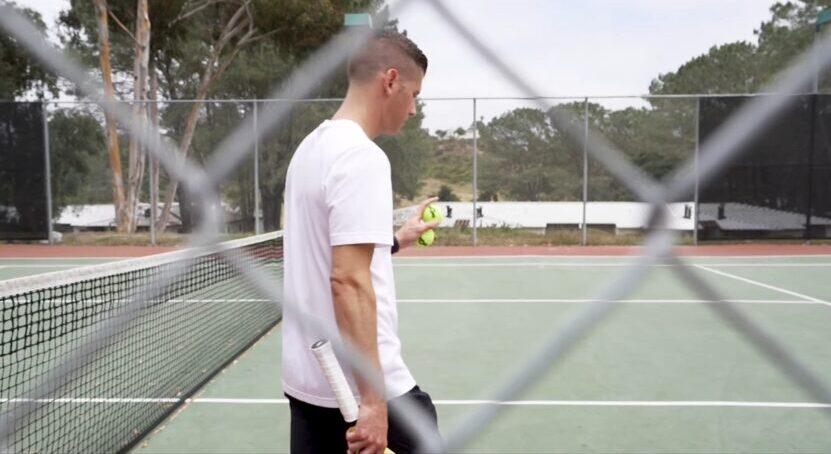Tennis is a game steeped in tradition and rules, and understanding terms like “deuce” is vital for appreciating the game.
It refers to a situation where both players have won three points each, and the game is tied at 40-40. Now, we want to explore the essential aspects, elucidating the concept for tennis enthusiasts and casual fans alike. Let’s go.
Definition and Origin
Deuce in tennis is more than just a term; it’s a critical juncture in the match where players are equally poised to win.
The term is believed to come from the French word “deux,” meaning two, signifying that a player needs to score two consecutive points to win the game from a point such as this one.
The concept of deuce is deeply intertwined with the unique scoring system of tennis, where the term is synonymous with tension and excitement.
It represents a high-pressure situation that can sway the match in favor of either player, depending on their performance and strategic approach during this occurrence.
Rules and Regulations
The importance of knowing the rules when a game reaches this point cannot be overstated. When both players reach 40-40, the next point won by a player gives them the advantage. If the player with the advantage wins the next point, they win the game; if not, the game returns to deuce.
The rule of advantage is crucial for making sense of the deuce. It adds an exciting twist to the match, putting players’ skills and mental resilience to the test. The game oscillates between deuce and advantage until one player secures a two-point lead, making deuce an unpredictable and thrilling phase in tennis.
What Does it Mean in a Match Strategy
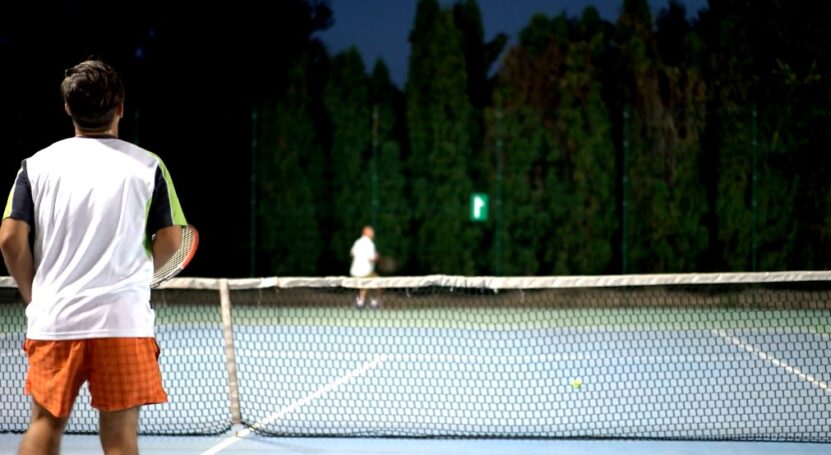
When a game reaches deuce, it becomes a battlefield of strategies and mental toughness. Players, aware of the high stakes, must showcase their best tactics to gain an edge over their opponents.
Developing a Game Plan
A well-thought-out game plan is a player’s best ally when facing a deuce. Players often strategize about exploiting their opponent’s weaknesses and playing to their strengths, focusing on serve placement, shot selection, and court positioning.
A player’s approach to deuce is a blend of meticulous planning and spontaneous decision-making.
Key Considerations in Developing a Game Plan:
- Serve Placement: A well-placed serve can put the opponent on the defensive from the start.
- Shot Selection: Deciding whether to play aggressively or conservatively is crucial.
- Court Positioning: Controlling the court can help in dictating the pace of the game.
Mental Resilience and Focus

Deuce is as much a mental battle as it is a physical one. Players need to maintain focus and composure, as any lapse in concentration can lead to their opponent gaining the upper hand.
The ability to stay mentally resilient when the game is hanging by a thread is often what separates the great players from the good ones. Cultivating mental strength is imperative for surviving the relentless back-and-forth of deuce.
A player’s capacity to handle pressure, make quick decisions, and remain unwavering in their resolve can significantly impact the outcome of the game. Thus, mastering the mental aspects of tennis is indispensable for triumphing in difficult situations.
Famous Deuce Moments in Tennis History
The tennis annals are rich with unforgettable moments that have left fans on the edge of their seats. These moments, etched in tennis lore, exemplify the drama and unpredictability inherent to particular situations.
Marathon Deuce Games
Some deuce games have gone down in history for their extraordinary length, showcasing relentless competition between the players.
One such example is the epic battle between John Isner and Nicolas Mahut at Wimbledon 2010, where numerous deuce games occurred, contributing to the longest match in tennis history, lasting 11 hours and 5 minutes over three days.
These marathon deuce games embody the spirit of persistence and endurance that defines tennis. They provide a fascinating glimpse into the players’ unwavering determination and the enthralling nature, which can prolong matches and push athletes to their limits.
Impact on Match Outcomes
These situations have often played a pivotal role in determining the outcomes of some of the most renowned matches. They can either be a turning point for a dramatic comeback or a stepping stone for securing victory.
The outcome can sway the momentum of the match, affecting players’ morale and the overall match dynamics. Its impact on match outcomes underscores the multifaceted nature of tennis, where every point counts, and the game can change in the blink of an eye.
It highlights the importance of capitalizing on critical moments and the indomitable spirit required to emerge victorious from the most challenging situations.
The Role of Fans and Atmosphere
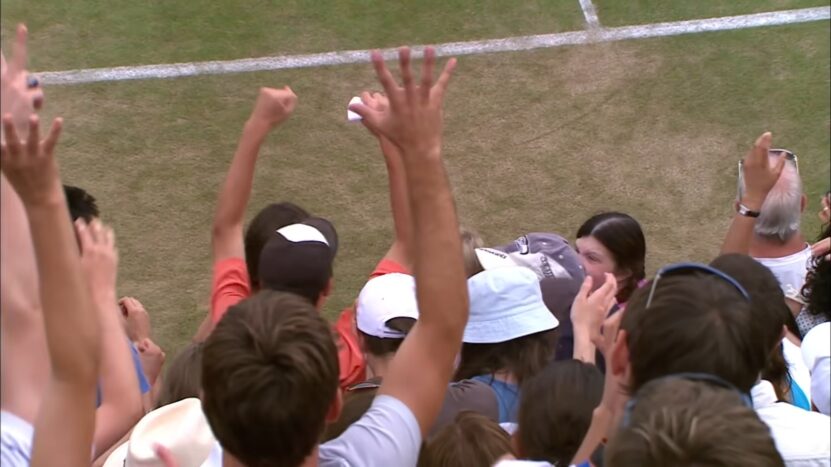
Deuce not only challenges the players but also engages the fans, creating an electrifying atmosphere. The crowd plays a vital role in shaping the energy within the tennis arena, especially during the intense moments.
Fans are The Unseen Competitor
The roar of the crowd, the clapping, and the cheers, all amplify the pressure and excitement during deuce. Fans, with their unwavering support and enthusiasm, become an unseen competitor, affecting players’ morale and performance.
Their reactions can either bolster a player’s confidence or amplify the pressure, making them an integral part of the experience. The role of fans in tennis transcends mere spectating; they create an atmosphere charged with emotions, influencing the players’ mental state and focus.
The energy emanating from the spectators during situations exemplifies the intertwined relationship between the sport and its followers, making tennis a collective experience of highs and lows.
How Does it Impact the Atmosphere?
The atmosphere during a deuce is a concoction of anticipation, tension, and excitement. The silent moments before a serve, followed by the eruption of cheers or sighs, elevate the thrill of the deuce. This dynamic atmosphere acts as a catalyst, intensifying the experience for both players and fans.
The ambiance in a tennis match is a reflection of the unfolding drama and the shared emotions of thousands of people. It brings to life the essence of tennis turning the match into a spectacular event where every point is a celebration of the sport’s spirit and passion.
How Does it Look from a Player’s Perspective?
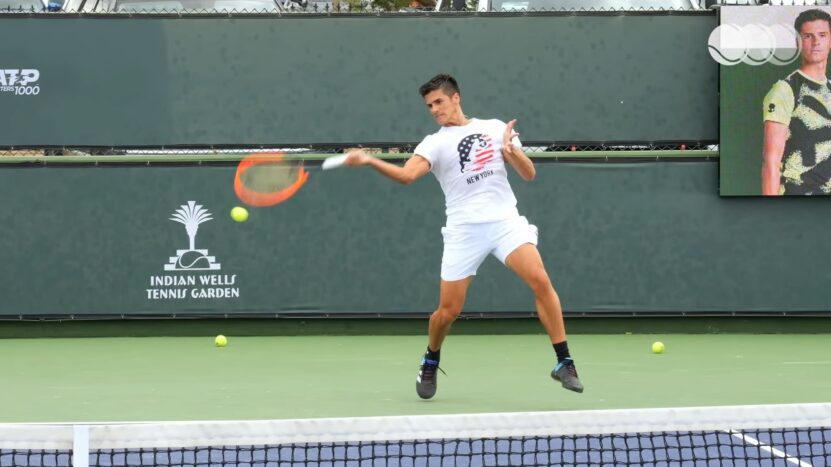
Deuce is a culmination of strategies, emotions, and endurance from a player’s perspective. It’s a battle against the opponent and oneself, demanding the best of skills, focus, and mental strength.
Strategic Adjustments
Players often re-evaluate and adjust their strategies when confronted with this moment. It might involve varying serve placements, modifying shot selections, or altering court positions to outmaneuver the opponent.
Every decision is crucial, as it can be the difference between gaining an advantage or returning to deuce.
Strategic Adjustments Include:
- Reading the Opponent: Anticipating the opponent’s next move can provide a strategic edge.
- Risk Management: Balancing aggressive and defensive plays is crucial.
- Energy Conservation: Managing stamina is essential, especially in prolonged situations.
Emotional and Psychological Management
Managing emotions and maintaining psychological equilibrium are pivotal for players during deuce. The ability to stay calm, focused, and positive can greatly influence the outcome.
Players often use mental conditioning, visualization, and positive affirmations to keep their emotions in check and stay in the moment. Emotional and psychological management is a cornerstone of a player’s success in tennis, especially in high-pressure situations like this one.
It determines a player’s ability to make rational decisions under stress, overcome setbacks, and seize opportunities, making it a key component in navigating deuce situations successfully.
The Impact on Viewership
Deuce situations, with their unpredictability and heightened tension, significantly enhance the viewing experience. They capture the core of competition, keeping the audience riveted, and contributing to the sport’s popularity.
Elevating Entertainment Value
Deuce contributes immensely to the entertainment value of tennis. The uncertainty and the continual tussle between advantage and it keeps the spectators and viewers on the edge of their seats, offering an unparalleled thrill.
These moments of heightened drama and competition make tennis more engaging and contribute to its global appeal. The heightened tension and the seesawing scores during these moments make every match a unique spectacle.
It elevates tennis from being just a sport to a form of entertainment, where the emotional rollercoaster and the unpredictable nature of the game keep the fans hooked and invested in the outcome.
Attracting and Retaining Viewers
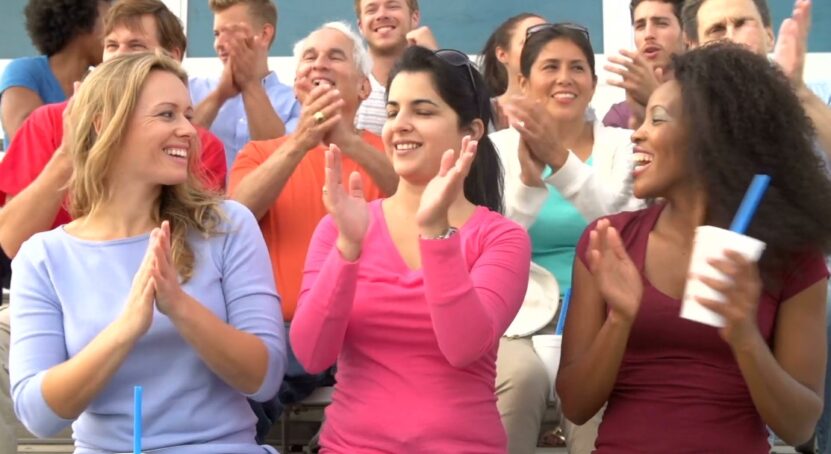
The excitement generated by deuce situations attracts a diverse viewership. The nail-biting finishes and the unexpected turns keep the existing fanbase engaged and draw new fans to the sport.
With its inherent drama, it plays a pivotal role in maintaining high viewership numbers and expanding the tennis audience globally. Its power to captivate and retain viewers is integral to the sport’s growth and popularity.
It exemplifies the competitive spirit and the relentless pursuit of victory in tennis, making it a fascinating watch for people from different walks of life and helping in fostering a diverse and inclusive tennis community.
FAQs
Is deuce a common occurrence in tennis matches?
It can be a common occurrence in closely contested tennis matches, where both players have a similar skill level and maintain a balanced score in a game.
Can a deuce occur multiple times in the same game?
Absolutely, a game can go to this point multiple times until one player manages to win two consecutive points from deuce and subsequently wins the game.
Can deuce affect the overall duration of the match?
Yes, matches with multiple situations can extend the duration significantly, as each one requires at least two additional points to decide the game.
Do all tennis matches follow the deuce rule?
While deuce is a standard rule in tennis, some matches, particularly in amateur leagues or informal play, might use alternative scoring methods, like “no-ad” scoring, where the first player to score four points wins, eliminating it completely.
Closing Thoughts
Deuce is not merely a scoring term; it’s a pivotal moment in the game, a convergence of focus, anticipation, and pressure, demanding the best from both players and offering a thrilling spectacle for the fans.
It’s a scenario we can easily call one of the competition’s corner-stone since exemplifies the relentless pursuit of victory, representing the quintessential tennis experience. If you are interested in this topic and are a beginner seeking to learn more about tennis, we recommend you check our article on tennis terminology that will navigate you through the commonly used terms on the court helping you fit better among professional players.

